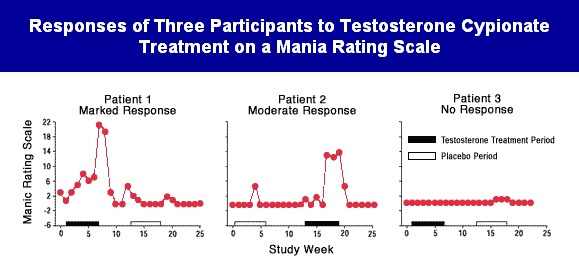Study Provides Additional Evidence That High Steroid Doses Elicit Psychiatric Symptoms in Some Men
Download PDF Version What is PDF?
Steven Stocker
Steven Stocker is a Contributing Writer for NIDA NOTES.
Source: NIDA
NOTES, Vol. 15, No. 4, September
, 2000
Public Domain
Table of Contents (TOC)
Article: Study Provides Additional Evidence That High Steroid Doses Elicit Psychiatric Symptoms in Some MenReferences
NIDA-supported research has produced additional evidence that high doses of anabolic-androgenic steroids can produce aggressive symptoms in some men. Dr. Harrison Pope and his colleagues at McLean Hospital in Belmont, Massachusetts, compared aggressive reactions in men who received alternate doses of steroids and placebo.
Anabolic-androgenic steroids have been widely, but illegally, available since the 1960s. "Anabolic" refers to steroids’ ability to promote tissue growth, while "androgenic" refers to their ability to promote the development of male sexual characteristics. People typically abuse steroids because they boost muscle size, particularly in the chest and shoulders.
 Responses to treatment with testosterone cypionate varied greatly among three study participants. On the Young Mania Rating Scale, a standard scale for rating mania, scores of less than 10 indicated that the participant had minimal psychiatric effects; participants with scores of 10 to 19 were rated moderately manic; and those with scores of 20 or higher were rated markedly manic.
Responses to treatment with testosterone cypionate varied greatly among three study participants. On the Young Mania Rating Scale, a standard scale for rating mania, scores of less than 10 indicated that the participant had minimal psychiatric effects; participants with scores of 10 to 19 were rated moderately manic; and those with scores of 20 or higher were rated markedly manic. Starting in the late 1980s, evidence began to accumulate that steroids may provoke manic symptoms, such as aggression, euphoria, grandiose beliefs, reckless behavior, and a decreased need for sleep. Reports of violence committed by people who had taken large doses of steroids began to appear in both the scientific literature and the lay press, and in surveys, steroid abusers themselves reported that the drugs prompted them to acts of aggression. However, some scientists questioned the significance of these reports. Perhaps the more aggressive or manic steroid abusers were the ones volunteering for the studies, critics said. Perhaps abusers were exaggerating the extent of their aggression because they considered aggression to be manly.
The only way to conclusively demonstrate that high steroid doses can provoke aggression and other manic symptoms is to administer high doses to volunteers in double-blind studies in which both the volunteers and the scientists are unaware of who is receiving steroids and who is receiving an inactive substance, or placebo. Three previous double-blind studies have been conducted: one at the University of Oklahoma College of Medicine in Tulsa in 1999; one at the Charles R. Drew University of Medicine and Science in Los Angeles in 1996; and one at the National Institute of Mental Health in Rockville, Maryland, in 1993. Collectively they confirm that high steroid doses can provoke severe aggressive and manic reactions in a minority of men.
The study conducted by Dr. Pope and his colleagues was the most recent and extensive, recruiting 50 men between the ages of 20 and 50. For the first 6 weeks of the study, the investigators gave half of the volunteers weekly injections of the steroid testosterone cypionate in gradually increasing doses. For the next 6 weeks, the men were given nothing, then for the subsequent 6-week period, they were given injections of a placebo, followed by another 6 weeks of no injections. The other half of the men were treated the same, except they received 6 weeks of placebo injections before receiving 6 weeks of steroid injections. Each time the men came in for their weekly injection, the researchers administered psychological tests to them. In addition, the men kept daily diaries of their psychological symptoms.
Of the 50 men who received all their steroid injections, 42 had only minimal psychiatric reactions to the drugs. However, two men developed prominent manic symptoms, and another six developed moderate symptoms.
 "People who responded to the steroid had different combinations of
manic symptoms," says Dr. Pope. "One man had an aggressive outburst
at work. Once, when he got cut off in traffic, he followed the person
in his car for several miles. The other man with a marked reaction became
euphoric and had a decreased need for sleep. Among the moderate responders,
one man playing in a college sports competition found himself wanting
to beat up his opponent. He said that he had never had such aggressive
feelings before in the course of a competition."
"People who responded to the steroid had different combinations of
manic symptoms," says Dr. Pope. "One man had an aggressive outburst
at work. Once, when he got cut off in traffic, he followed the person
in his car for several miles. The other man with a marked reaction became
euphoric and had a decreased need for sleep. Among the moderate responders,
one man playing in a college sports competition found himself wanting
to beat up his opponent. He said that he had never had such aggressive
feelings before in the course of a competition."
One of the psychological tests given to the volunteers was the Point Subtraction Aggression Paradigm, which has been widely used to measure aggression in alcoholics, drug abusers, adolescents, and other populations. In this test, the volunteers played a computer game in a booth. Each was told that he was playing against a man in another booth, when actually his opponent was a computer. The man could accumulate points by pressing one button on a board and could deprive his "opponent" of points by pressing another button. At the end of the game, accumulated points could be exchanged for money. During the game, the computer provoked the man by randomly depriving him of points. The man’s aggression score consisted of the number of points that he subtracted from his "opponent" in retaliation.
The results showed that the steroid injections significantly increased aggression scores, although, again, most of the men were only minimally affected, while a few showed substantial aggression. "These aggressive responders would pound on the board and yell and swear at what they thought was their opponent in the neighboring booth, who was, of course, a computer," says Dr. Pope. "It was quite dramatic."
Why a few men develop manic reactions to steroids while most do not remains a mystery, Dr. Pope says. Those who reacted with manic symptoms were not more likely to have taken steroids before, to have been a weightlifter, or to have a family history of psychiatric disorder. They also did not differ in various physiological measures, such as the blood level of testosterone following the steroid injections.
"I think that the evidence from this and previous studies indicates that, for unknown reasons, somewhere between 2 and 10 percent of men develop manic behavior and other neuropsychiatric complications from high doses of steroids," says Dr. Jag Khalsa of NIDA’s Center on AIDS and Other Medical Consequences of Drug Abuse. "These studies were done with 500 and 600 mg per week of steroids, while in actual practice, steroid abusers often take as much as 1,000 or 1,500 mg per week. With these higher doses, the percentage developing manic symptoms is likely to be higher."
Pope, H.G., Jr.; Kouri, E.M.; and Hudson, J.I. Effects of supraphysiologic doses of testosterone on mood and aggression in normal men: A randomized controlled trial. Archives of General Psychiatry 57(2):133-140, 2000.
Pope, H.G., Jr.; Phillips, K.A.; and Olivardia, R. The Adonis Complex: The Secret Crisis of Male Body Obsession. New York: The Free Press. 2000.


